Folk Studies Program History
In 2017, the WKU Folk Studies Program celebrated a century of folklore research and
teaching at Western Kentucky University. To learn more about this legacy of research,
explore the themes below:
Timelines of Folklore Research at Western Kentucky University
Born in far western Kentucky, Gordon Wilson entered Western Kentucky Normal School
in 1908 and began teaching there in 1912. Intrigued by folklore in his undergraduate
days, in 1917, Wilson announced his intention to begin local folklore research. He
went on to Indiana University and studied under fellow Kentuckian Stith Thompson.
Returning to Western Kentucky, Wilson headed up the English department from 1928-1959,
establishing a legacy of teaching and writing about folklore. 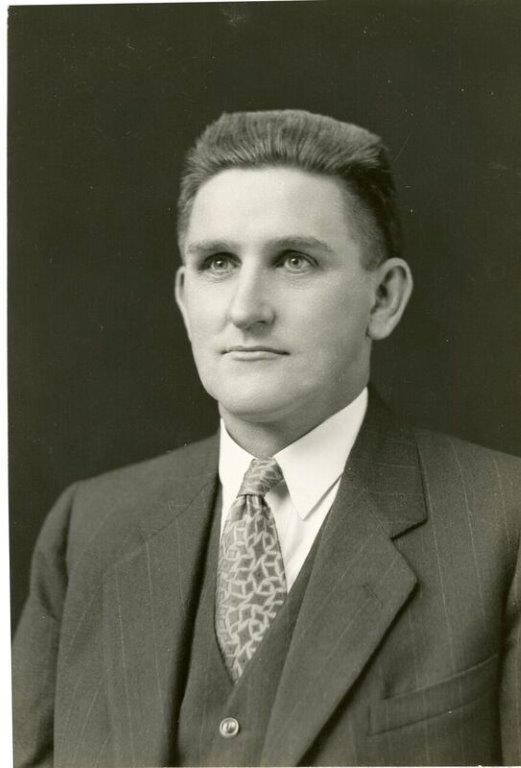
1917, Gordon Wilson wrote in his private diary:“I began today a collection of what I call folk-lore notes, partly for the pleasure I get out of working with folk material, partly for source material for work in Philology next year, and partly, probably chiefly, for a background for my projected ‘Purchase Stories.’ . . . I already have in the book over 175 ‘cuss-words’ and over 100 well-known superstitions in my home neighborhood. When I go to Calloway County next week I hope to get a great deal of help on my collection from Quint, mother, and Ivan. Ever since I first began to teach Vergil – January, 1912 – I have been interested in local folk-lore and have, at numerous times, discussed before bodies of teachers some of the things I have learned. Prof. Aydelothe, now of Massachusetts School of Technology, encouraged me in my folk-lore studies and introduced me to that famous preserver of the cowboy ballads of Texas, Prof. Lomax of Texas University.”
Photo: Gordon Wilson
Hired by Wilson in 1950, D. K. Wilgus was finishing his dissertation on Anglo-American
ballad scholarship at Ohio State. For the next decade, Wilson and Wilgus (along with
Herbert Halpert at Murray State and William Hugh Jansen at the University of Kentucky)
became key figures in the Kentucky Folklore Society which had a membership of over
300. In the mid-1950s, Wilgus created the Kentucky Folklore Record. In the early 1960s,
Wilgus called for the building of academic programs in Kentucky, but lamented the
loss of folklorists at other academic institutions in the state.
1955, Kentucky Folklore Record established and D. K. Wilgus wrote:“One of the greatest weaknesses of regional journals has been their almost exclusive appeal to the learned, professional folklorist. . . . We believe that there is a middle way, that the amateur and the professional can find common ground, that there is a place in Kentucky for a folklore magazine that is popular without being cute or folksy, and scholarly without the trappings of erudition.”
1962, D. K. Wilgus wrote in the Kentucky Folklore Record:“One of the most important immediate tasks of the [Kentucky Folklore] Society is to contribute to the establishment of folklore study as a recognized discipline in all of the institutions of higher learning in the commonwealth.”
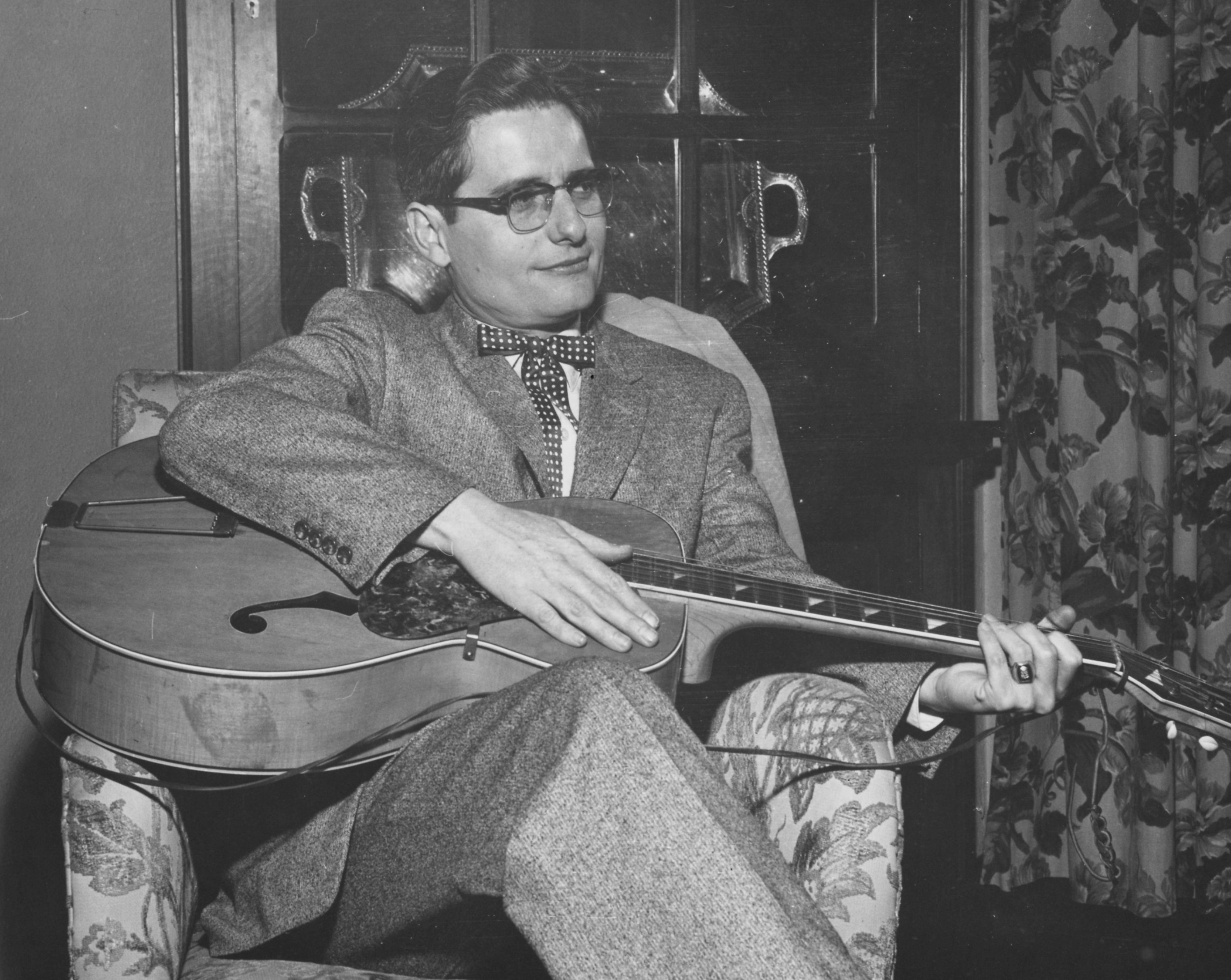
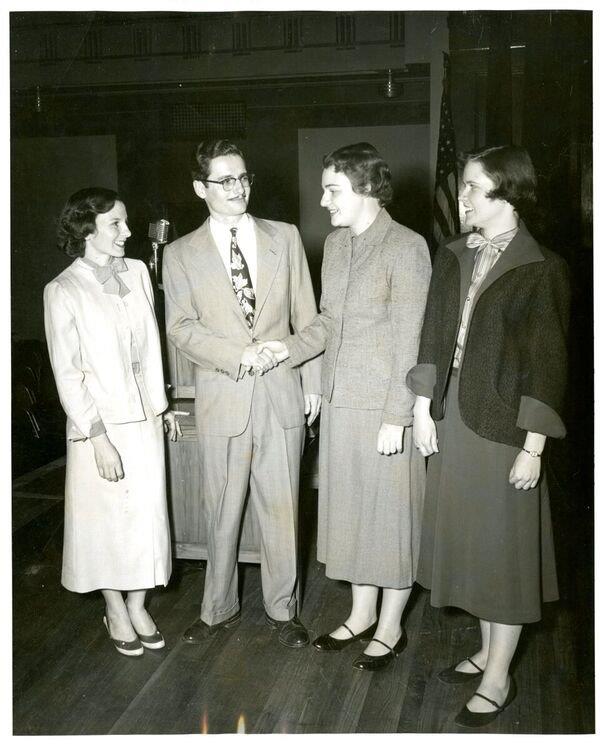
Photo on left: D.K. Wilgus; Photo on right: D.K. Wilgus, 1955 (second from left)
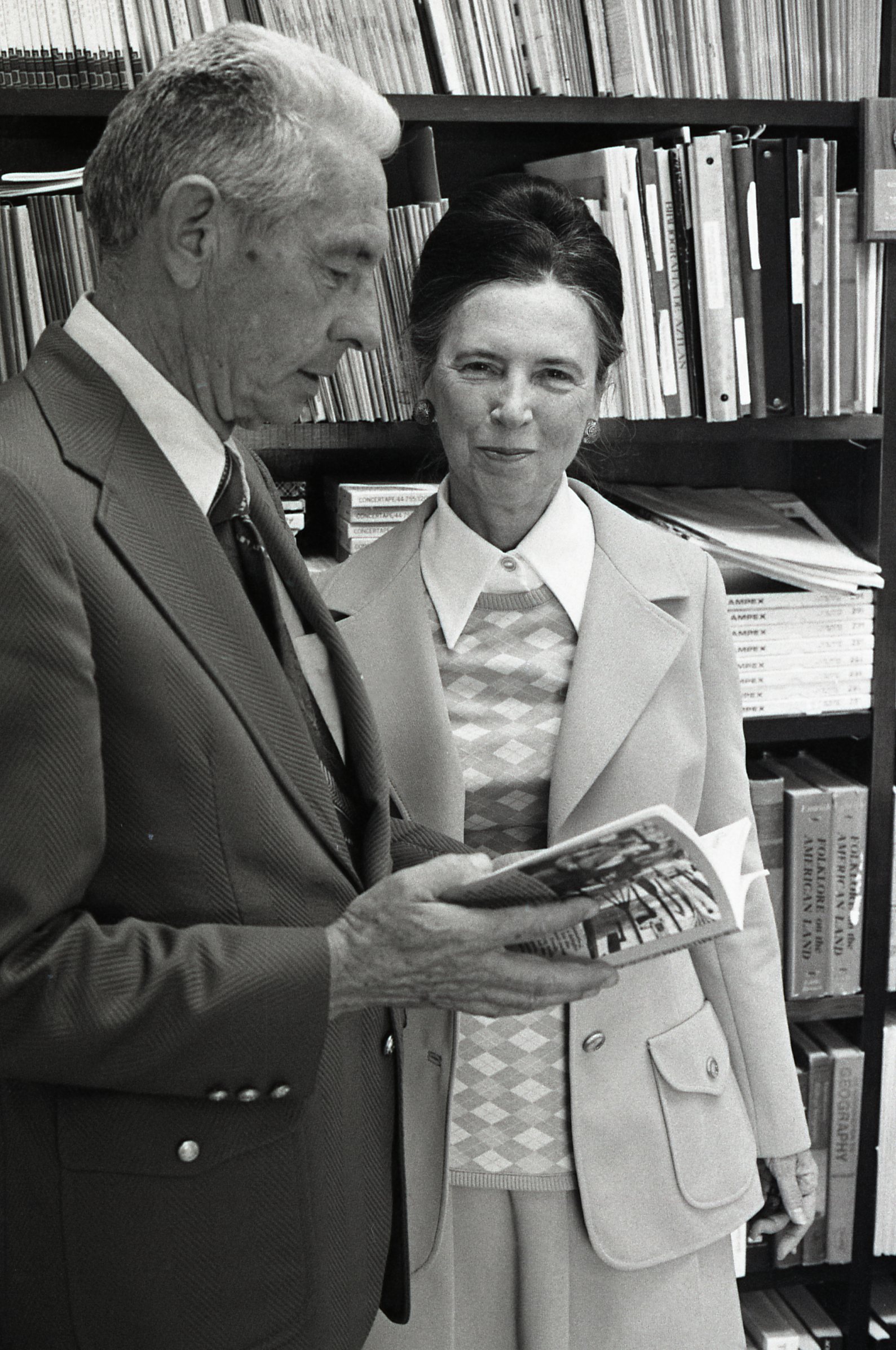 After the departure of Wilgus for UCLA, Gordon Wilson made sure additional folklorists
were hired. First came Kenneth Clarke, who discovered his commonality with Wilson.
After the departure of Wilgus for UCLA, Gordon Wilson made sure additional folklorists
were hired. First came Kenneth Clarke, who discovered his commonality with Wilson.
Subsequently Mary Washington Clarke and Lynwood Montell (a former student of Wilgus) were hired and in 1969, the Center for Intercultural Studies was established.
1960s, Kenneth Clarke writing about Gordon Wilson:“One of our first points of common interest was our discovery that our respective experiences as graduate students under Stith Thompson’s direction had spanned our old professor’s graduate faculty career: Gordon Wilson was among the first; I was among the last to have that privilege.”
Photo: Kenneth Clarke and Mary Washington Clarke
Following the establishment of an undergraduate minor in folklore in 1968, Western Kentucky University created an MA program in 1972. The original core faculty included Kenneth and Mary Clarke, Lynwood Montell, and Camilla Collins.
While the Clarkes retired during the 1970s, Montell, Collins, and Burt Feintuch, along with new generations of folklorists, continued to build the program.
By the end of the decade the program had established dedicated tracks in both public
folklore and historic preservation. Leading public folklorist Archie Green recognized
the significance of the program in establishing training for the public sector.
1984, Archie Green writing about the WKU Program:“This was the first school to recognize the field we now call public sector folklore—this is, trained folklorists working for federal agencies, state agencies, local agencies, the park service, the Smithsonian, the Library of Congress, recreation departments, school boards. . . . this is the school that first recognized the necessity to train people for that responsibility. . . . Lyn Montell and his colleagues . . .shaped a program to give students the vision that they might combine knowledge in a very esoteric field with service to the larger community.
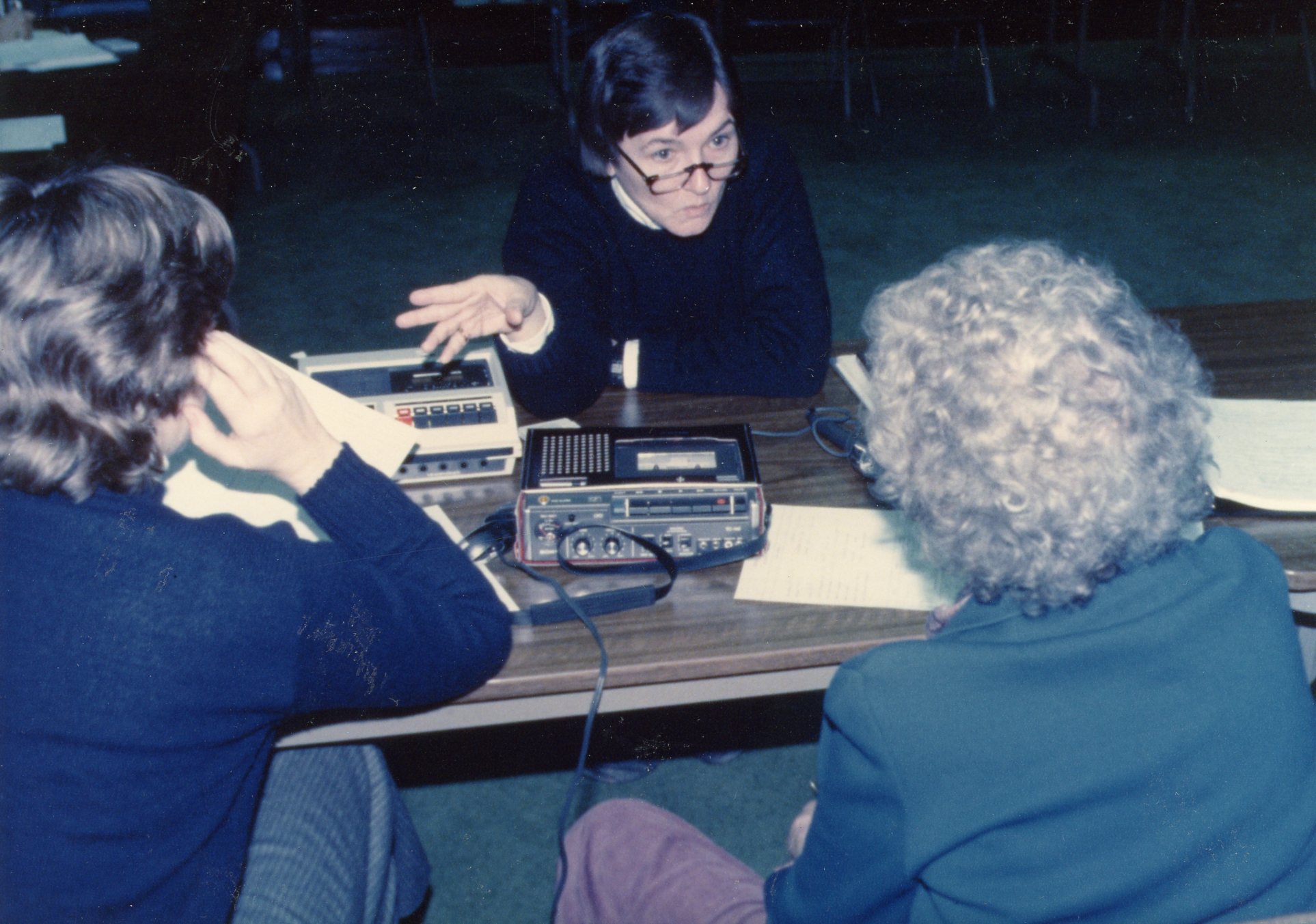
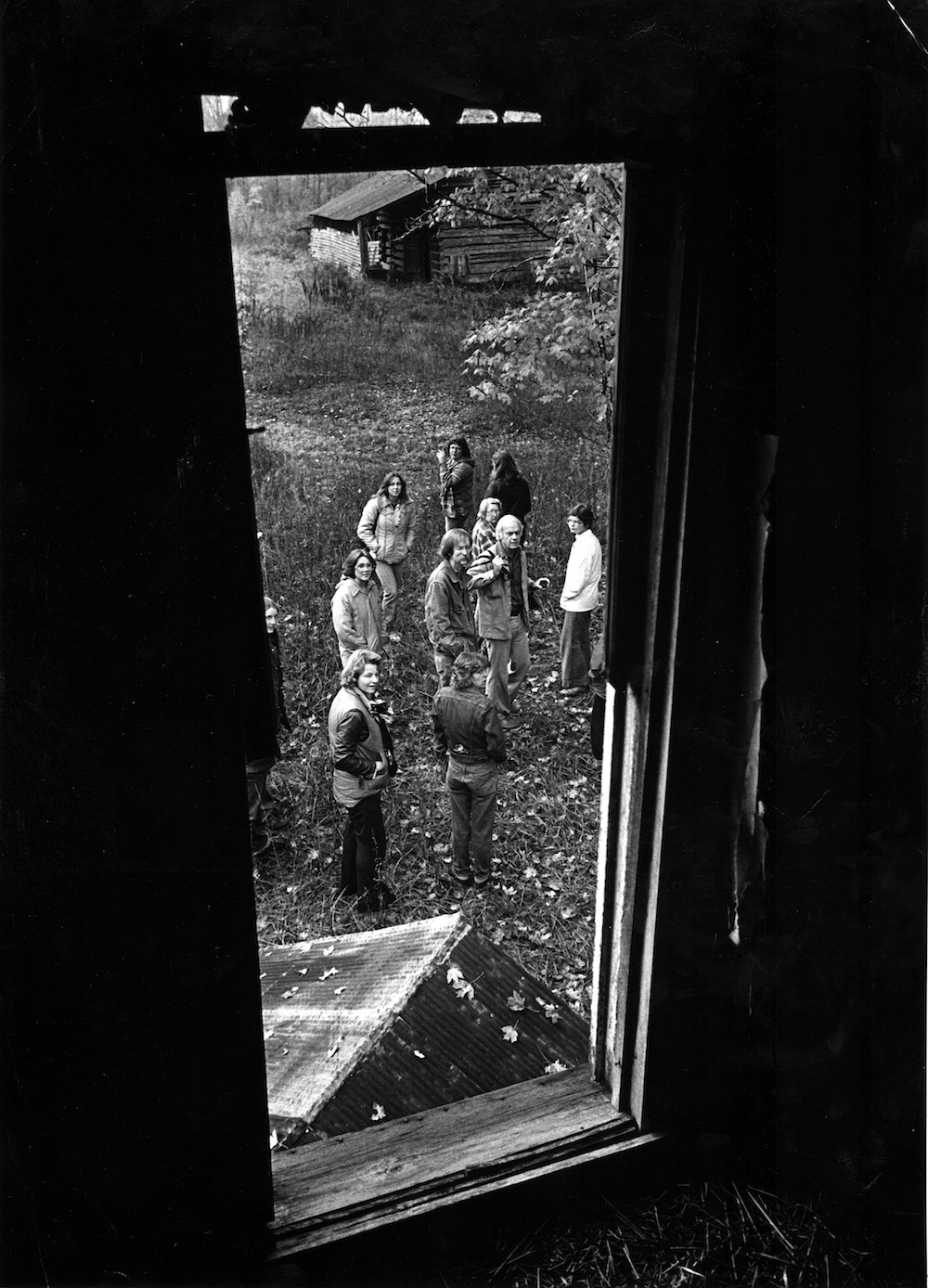
Photo on left: Camilla Collins; Photo on right: Lynwood Montell and students
The Folk Studies program was housed in several different units over the years, as the organization of the university changed. In 2004 Michael Ann Williams led the successful charge for the creation of the Department of Folk Studies and Anthropology. Williams remained department head until her retirement in 2017.
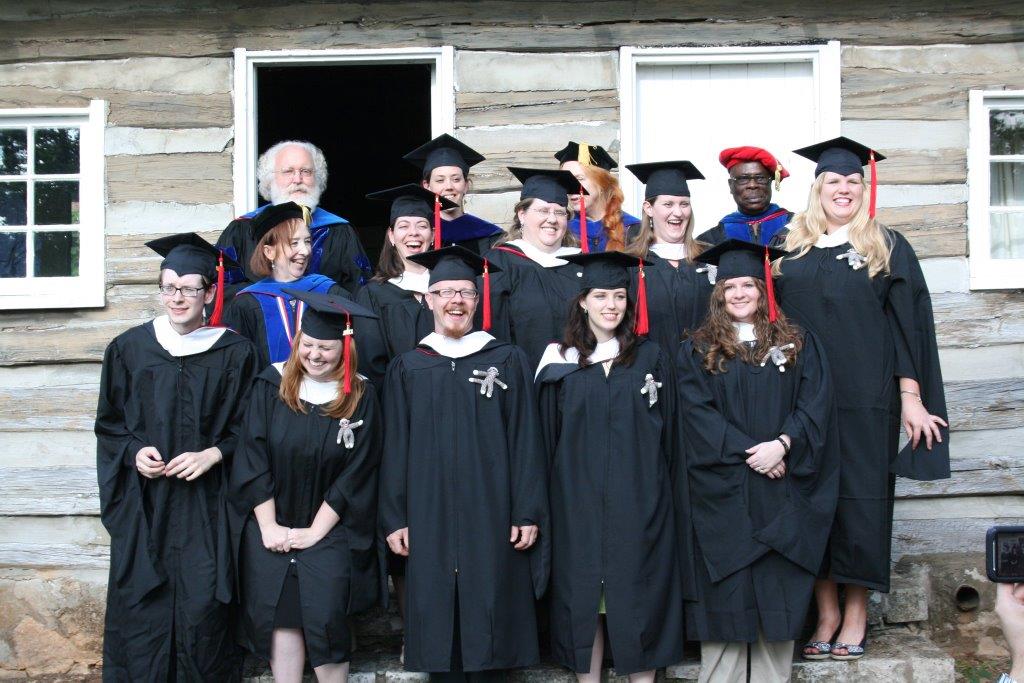
Photo: Graduating Folk Studies Class of 2011 standing outside the Pioneer Log Cabin
The Journal of American Folklore at Western Kentucky University
In 2014, the Executive Board of the American Folklore Society chose WKU as the home
of the Journal of American Folklore, with Ann K. Ferrell as Editor-in-Chief and Associate Editors Brent Björkman, Erika
Brady, Timothy H. Evans, Kate Parker Horigan, and Michael Ann Williams. The journal has been published quarterly since the founding of the American Folklore
Society in 1888. Learn more.
The Kentucky Folklife Program at Western Kentucky University
For 30 years the Kentucky Folklife Program (KFP) has been dedicated to the mission of documenting, presenting, and conserving the diverse traditional culture and heritage of the Commonwealth.
Founded in 1989 as an inter-agency partnership between the Kentucky Historical Society and Kentucky Arts Council, KFP moved to its current home at Western Kentucky University in 2012. Now housed in the Department of Folk Studies and Anthropology at WKU, KFP is physically located in the Pioneer Log Cabin on WKU’s campus. Learn more.
Departmental Leadership in the American Folklore Society
The WKU faculty continue to provide leadership in the discipline. In 2014-2015, Michael Ann Williams served as president of the American Folklore Society, the first AFS president from Kentucky since Herbert Halpert in 1955.
That same year, in 2014, the Executive Board of the American Folklore Society chose WKU as the new home of the Journal of American Folklore, with Ann K. Ferrell as Editor-in-Chief.
In 2015, Erika Brady was elected as president of the AFS Fellows.
WKU Folklore Faculty over the years:
Gordon Wilson (PhD, Indiana University)
D. K. Wilson (PhD, Ohio State University)
Kenneth Clarke (PhD, Indiana University)
Mary Clarke (PhD, University of Pennsylvania)
Lynwood Montell (PhD, Indiana University)
Camilla Collins (PhD, Indiana University)
Burt Feintuch (PhD, University of Pennsylvania)
Robert Teske (PhD, University of Pennsylvania)
Jay Anderson (PhD, University of Pennsylvania)
Marilyn White (PhD, University of Texas)
Michael Ann Williams (PhD, University of Pennsylvania)
Cheryl Keyes (PhD, Indiana University)
Erika Brady (PhD, Indiana University)
Johnston A. K. Njoku (PhD, Indiana University)
Larry Danielson (PhD, Indiana University)
Tim Evans (PhD, Indiana University)
Chris Antonsen (PhD, Ohio State University)
Barry Kaufkins (MA, WKU)
Mabel Agozzino (PhD, Berkeley)
Ann K. Ferrell (PhD, Ohio State University)
Brent Björkman (MA, WKU)
Kate Parker Horigan (PhD, Ohio State University)
Tim Frandy (PhD, University of Wisconsin-Madison)
Sydney Varajon (PhD, Ohio State University)
Ciara Bernal, 2024, "Not Like Your Abuelos”: A (Fe)minist/Autoethnographic Approach to Vernacular Religious Belief and Traditionalization"
Allison Cate, 2023, "A United, Not a Divider: Community, Identity, Performance & the Tomato Krewe Parading Group of East Nashville's Tomato Art Festival"
Azadeh Najafian, 2021, "Ethnography of Reading Comic Books"
Camille Acosta, 2021, "La Llorona, Picante Pero Sabroso: The Mexican Horror Legend as a Story of Survival and a Reclamation of the Monster"
Zahra Abedinezhadmehrabadi, 2020, “'I Choose the Styles Which are both Traditional and Artistic': Iranian Women’s Ways of Dress"
Chloe Brown, 2018, "On Being Trans: Narrative, Identity, Performance, and Community"
Jessica Krawec, 2018, "An Adventure Concerning Identity: The Use of Folklore and the Folkloresque in Murakami’s Hitsuji Wo Meguru Bōken (A Wild Sheep Chase) to Construct a Post-Colonial Identity"
Anita Kay Westhues, 2017, "Beliefs and Practices Related to Community Water Sources: "The Specialness of Springs"
Azadeh Vatanpour, 2017, "The Healing Power of Music and Chants amongst The Ahl-E Haqq People"
Sarah T. Shultz, 2017, "Nightmares in the Kitchen: Personal Experience Narratives About Cooking and Food"
Samantha G. Castleman, 2017, "Inexhaustible Magic: Folklore as World Bulding in Harry Potter"
Anthony Stellaccio, 2016, "The Past is Open to the Future: Lithuanian Folk Pottery 1861 Present"
Eleanor Hasken, 2016, "Performing Gender through Bowling, or 'I was in Shock Other Girls Could Bowl'"
Virginia Siegel, 2015, "Traditional Cultural Properties and Casita Rincón Criollo"
Dale Joseph Rose, 2015, "Our Master’s Legacy: Belief and Ritual in Mission De L’esprit Saint"
Afsaneh RezaelSahrael, 2014, "Iranian Political Humor in Social Media"
Ehsan Estiri, 2014, "Let's Do It, We Will Find Out Why: Traditional Performances and (Re)Construction of Its Traditional Beliefs in the Case of the Persian Bonfire Ceremony, Wednesday Feast"
Renee Pinkston, 2014, "A Rejuvenating Resort Remembered: The Use of Folklore and Archaeology in the Investigation of the Historic Massey Springs Resort in South-Central Kentucky"
Steven Goddard, 2014, "Neither (Fully) Here Nor There: Negotiation Narratives of Nashville's Kurdish Youth"
Amber Slaven, 2012, "The Japanimated Folktale: Analysis Concerning the Use and Adaptation of Folktale Characteristics in Anime"
Arthur Van Ness IV, 2012, "Haunts of the Hill: Western Kentucky University Ghostlore"
Suzanne Barber, 2011, "The Transformation of a Shire: Local Negotiation in the Society for Creative Anachronism"
Matthew Hale, 2010, "Human Things: Rethinking Guitars and Ethnography"
David Puglia, 2010, "The Folklife Archives at Western Kentucky University: Past and Present"
Cynthia Cotton, 2010, "The Blood Drive of WKU Greek Week: Issues of Altruism, Egoism, Integration, and Separation"
Butch Ross, 2007, "My Whole Life Balanced on a Needle: The Obliquely Traditional Quilts of Bernice Enyeart"
Michael Kinsella, 2007, "The Incunabula Papers: Legend-Tripping and World-Making in Cyberspace"
Matthew Cook, 2007, "The Narratives of Ann Lee as a Core Component of Shaker Theological Evolution"
Mary Koegel, 2007, "Never Alone: A "Look" at Imaginal Companions"
Kevin Murphy, 2004, "Making the Scene: An Investigation of the Rock and Roll Scenes of Nashville, Tennessee and Athens, Georgia"
Andrea Kitta, 2003, "Narratives of Cancer Survivors in Religious Life"
Amber Ridington, 2002, "At the Crossroads: Commercial Music and Community Experience, The Quonset Auditorium Roadhouse on the Dixie Highway"
Dina Abousamra, 2001, "Beirut's Displacements: Reconstituting Place and Community in a Time of War"
Cara Hoglund, 2000, "Transformations: A Folkloric Exploration of the Musical Comedy Into the Woods by Stephen Sondheim and James Lapine"
Kirsten Anderson, 1999, "National Powers of Belief: Folklore, Mythology and Festival in Nazi Germany"
Ann Ferrell, 1999, "Beyond Celebration: A Call for the Study of Traditions of Dominance"
Virginia Scheer, 1999, "Farmhouses That Become Boarding Houses in the Catskill Mountains of New York State"
Brian Gregory, 1998, "Approaching Fallingwater: An Ethnography of Place"
Andrea Mericle, 1998, "Festivals, Function and Context: An Ethnographic Study of Three Festivals at Holden Village"
Hayden Roberts, 1998, "Portraits and Landscapes in Family Narrative"
Steven Warrick, 1997, "Does Your Faith in God and Country Need a Boost? Reflections of Idealism and Identity and the Art of Bill John Roth"
Kymberly Helbig, 1996, "'An Exploration of the Self': Contemporary Tattooing in the Creation and Expression of Identity"
Brandon Kwiatek, 1995, "The Dark Ride"
John Morgan, 1995, "Dark Fired Tobacco: The Origin, Migration and Survival of a Colonial Era Agrarian Tradition"
Thomas Zimmerman, 1995, "Roadside Memorials in Five South Central Kentucky Counties"
James Nelson, 1994, "Hillbilly Music and Early Live Radio Programming in Bowling Green and Glasgow, Kentucky: Country Music as a Local Phenomenon"
Tami Harbolt, 1993, "Too Loved to Be Forgotten: Pet Loss and Ritual Bereavement"
Joseph Ruff, 1993, "Country Music in the Northeast: Two Careers"
Richard Callahan, Jr., 1993, "Legends and Narratives of Phantom Ships: An Examination of Belief"
Jimmy Browning, 1992, "The Lost Tribalism of Years Gone By': Function and Variation in Gay Folklore in Armistead Maupin's Tales of the City Novels"
Jon Rushing, 1991, "Horsetrading: An East Texas Study in Establishing Context"
Janet Tracy, 1991, "Jack Epperson: A Modern Folk Healer"
Mella Davis, 1991, "Zora Neale Hurston: The Voice of the Goddess"
Gregory Jenkins, 1990, "The Altered Mobile Home: A Stationary Image of Work and Value"
Sara McNulty, 1990, "An Ethnography of a Trance Channeling Session"
ElizaBeth Hester, 1989, "Vadie Williams, Folk Artist: Drawnwork as a Reflection of Personal Identity in Rural Kentucky"
Mary Zwolinski, 1988, "Displays of Culture: Personal Museums in Wisconsin"
Eleonore Mitchell, 1988, "Pre-Lent Celebrations: Shrovetide and Carnival"
Chad Berry, 1988, "Folk Custom as a Barometer of Social Change in a Tennessee Community"
Gregory Hansen, 1987, "The 'Blankety-Blank' of Bear Creek Camp: A Rhetorical Analysis of a Folk Drama"
Ann Taft, 1986, "At the Spiritual Grassroots': An Analysis of Visionary Art and Artists"
Sheila Riley, 1986, "Mam Ma: An Oral Life History of Mona Baldwin"
Donald Beisswenger, 1985, "Singing Schools in Southcentral Kentucky"
Julie Hauri-Foster, 1984, "Two Hairdressers: Artistry and Communication"
Kathleen Young, 1983, "Ethnobotany: A Methodology for Folklorists"
Deborah Hall, 1983, "Using Folklore to Teach English as a Second Language"
Denis Kiely, 1983, "The Loving of the Game: A Study of Basketry in the Mammoth Cave Area"
Theresa Jureka, 1983, "Women and Work at the Turn of the Century: The Mrs. A.H. Taylor Dressmaking Company"
Jan Laude, 1982, "A Contemporary Female Psychic: A Folkloristic Study of a Traditional Occupation"
Ervin Mason, 1982, "A Study of the Biblical Narrative of Saul, Including Investigation of the Folktale and Proverb as Genres of Folk Narrative"
Nana Farris, 1982, "Ink in My Blood: The Folklore of a Commercial Print Shop"
Timothy Cochrane, 1982, "The Folklife Expressions of Three Isle Royale Fishermen: A Sense of Place Examination"
Edward McCurley, 1982, "A History of the Bowling Green Fire Department: A Look at Two Traditional Methodologies"
Martin Ostrofsky, 1982, "O. Henry's Use of Stereotypes in His New York City Stories: An Example of the Utilization of Folklore in Literature"
Debbie J. Gibson, 1981, "Folklore, Folklife and Still Photography: A Synergetic Approach"
Keith Ludden, 1981, "'No Bob Yet': A Collection of Narratives from Nobob, Kentucky"
John Marshall, 1981, "Barbecue in Western Kentucky: An Ethnographic Study"
Jan Alm, 1981, "A Sourcebook for the Interpretation of Traditional Dance by Outdoor Museums and Historic Sites"
Elizabeth Harzoff, 1981, "'They'd Have the Biggest Time You Ever Saw': Square Dances as Settings for Community Social Interaction in Trigg County, Kentucky Ca. 1920-1979"
R. Raymond Allen, 1981, "Old-Time Music and the Urban Folk Revival"
Gilbert Howard, 1981, "Fiddle Songs and Banjo Songs: A Description and Index"
Mary Weldy, 1980, "A Study of the Usefulness of Folkloric Topics in a Remotivation Technique Program with Institutionalized Elderly Persons"
George Reynolds, 1980, "Home, Loved Ones, and Heaven: Folk Expression in the Songs of Katherine O'Neill Peters
Sturgil"
Rebecca Morse, 1979, "Tinsley Bottom, Tennessee: An Historical Reconstruction Utilizing Oral Narrative Traditions"
Lori Kaplan, 1979, "The Lark on the Strand: A Study of a Traditional Irish Flute Player and His Music"
Kate Grenier, 1978, "Folklore, Poetry, and Identity: A Study of the Archetypes in the Poetry of Leslie Silko"
J. Vaughan Webb, 1977, "Traditional Elements in the Selected Columns of Allan M. Trout"
Gayle Waggoner, 1977, "They Made Us Dance in the Pig Trough!" Mrs. Blanche Story's Oral Accounts of Dating, Courtship, Marriage and Sexual Attitudes in North Centrsl Nebraska"
Benjamin Vincent, 1977, "The Price of Folk: The Progression of Two Decoy Makers' Work from Folk to Non-Folk"
David Axler, 1977, "Fandom is a Way of Life: A Folkloristic Ethnography of Science Fiction Fandom"
Dianna Zacharias, 1976, "An Interpretation of the Florida Ex-Slaves' Memories of Slavery and the Civil War"
Eugene Umberger Jr., 1975, "Tobacco Farming: The Persistence of Tradition"
Ada Parker, 1975, "The Cedar Grove Community in Oral Folk History"
Michael Morse, 1975, "The Hensley Settlement: An Oral Folk History of Its Material Culture"
Information in the above timelines is based on research by Michael Ann Williams, University Distinguished Professor of Folk Studies, Emeritus.
All photographs from Western Kentucky University Library Special Collections. Class of 2011 photograph provided by the WKU Department of Folk Studies and Anthropology.
Some of the links on this page may require additional software to view.

